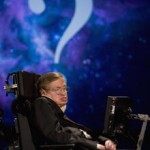By Susan Brinkmann, OCDS
Staff Journalist
Comments made by emminent theoretical physicist Stephen Hawking that heaven is a “fairy story for people afraid of the dark” is drawing widespread criticism from scientists, theologians, and the faithful alike.
 The 69 year-old Hawkings, who was expected to die within a few years after being diagnosed with a degenerative neuron disease at the age of 21, made the comments in an interview published on Monday in The Guardian newspaper.
The 69 year-old Hawkings, who was expected to die within a few years after being diagnosed with a degenerative neuron disease at the age of 21, made the comments in an interview published on Monday in The Guardian newspaper.
“I have lived with the prospect of an early death for the last 49 years,” Hawking said. “I’m not afraid of death, but I’m in no hurry to die. I have so much I want to do first.”
He continued: “I regard the brain as a computer which will stop working when its components fail. There is no heaven or afterlife for broken-down computers; that is a fairy story for people afraid of the dark.”
When asked how we should live, he said, “We should seek the greatest value of our action.”
Hawking, who was Lucasian professor of mathematics -a post once held by Isaac Newton -has a history of drawing criticism for his comments on religion, and this time was no different.
“I think that people in general believe that scientists don’t believe in God, and that’s just not true,” said Scott C. Tyson, physicist and author of The Unobservable Universe: A Paradox-Free Framework for Understanding the Universe .
“History is filled with scientists who were also men of faith, from Copernicus, Galileo, and Newton to Einstein. Now, I do also believe that there are other scientists who would like to prove that God doesn’t exist. These scientists might want to rain on everyone else’s parades with respect to God really, really badly. . . .
“ . . .(S) science oftentimes becomes blocked politically and socially not because the science contradicts religion, but because the argument is framed in an ‘us versus them’ context. We inadvertently challenge people to either believe in science or to believe in God, at the exclusion of the other. It’s an unreasonable and unnecessary position in which to place anyone.”
Hawking, who is almost completely paralyzed and must speak through a voice synthesizer, seems to be among the ranks of those scientists who are out to prove God doesn’t exist. His 2010 book The Grand Design provoked a backlash among religious leaders, including Lord Sacks, Britain’s chief rabbi, for arguing there was no need for a divine force to explain the creation of the universe. Sacks accused Hawking of committing an “elementary fallacy” of logic.
About the latest flap, Stephen Green, director of Religious group Christian Voice, told Science News that by comparing the human brain to a computer shows that Hawking is able to consider things in a materialist way only. He said that belief in God drives out the fear of the dark and expressed surprise at how Hawking could fail to comprehend the spiritual dimension.
Author Michael Wenham agrees. Like Hawking, he has been living with the same motor neuron disease and says that to accuse him of believing in life and after death because he’s afraid of the dark is insulting.
“For someone ‘facing the prospect of an early death,’ with probably an unpleasant prelude, the idea of extinction holds no more fear than sleep,” Wenham writes in Holy Post. “It really is insulting to accuse me of believing there might be life after death because I’m afraid of the dark. On the contrary, sad though I shall be to leave behind those I love, I suspect the end of life, whatever happens, will be a relief. And, like Pascal making his wager, if it is dark, I really won’t mind, because, of course, there won’t be a me to mind.”
He goes on to say that his belief in life after death isn’t based on wishful thinking, but hard evidence.
“If the brain is a computer, then, when I was studying where Stephen Hawking now teaches, I came on a mass of data of which the most convincing, the neatest, explanation was that death is not the end of life. It wasn’t the most comfortable nor most obvious of conclusions, but the forensic case was forceful and beautiful, providing ‘simple explanations of phenomena or connections between different observations’.”
The best exposition of this evidence he ever found was by then director of the Institute of Advanced Legal Studies in London, Professor Sir Norman Anderson, in The Evidence for the Resurrection.
“My disturbing conclusion was that, if it happened once, as seemed beyond reasonable doubt, then I needed to revise my whole world view. What you see is not all you get.”
© All Rights Reserved, Living His Life Abundantly®/Women of Grace® http://www.womenofgrace.com









